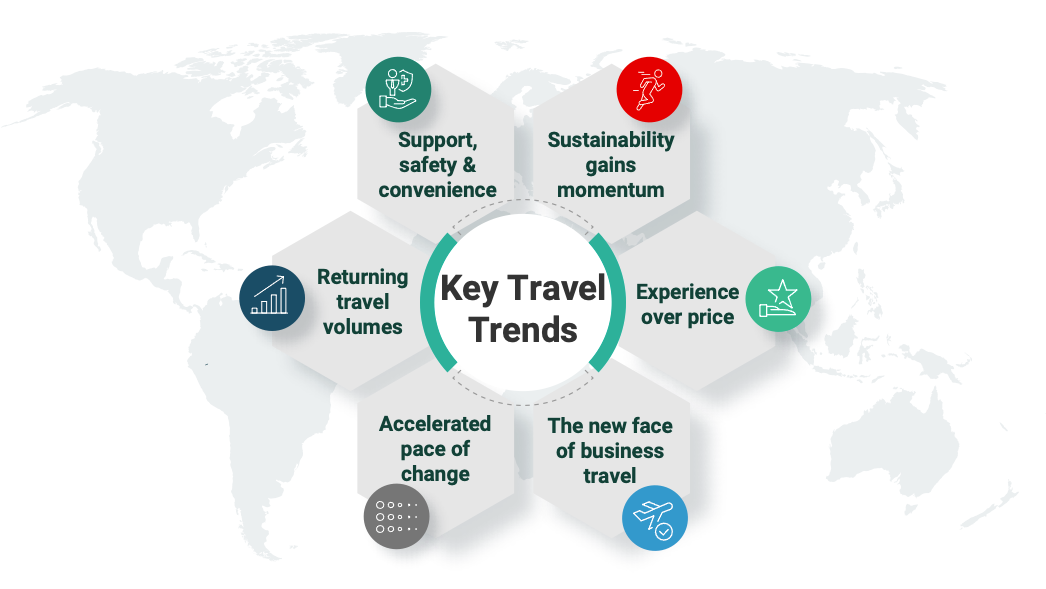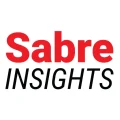Vacation season is just around the corner. To glean insight into the travel industry recovery landscape as the busiest travel season of the year approaches, Sabre recently conducted both quantitative and qualitative surveys with airlines and travel agents across the globe. Gathering input from more than 500 respondents, in 8 languages, and 20 countries, provided a robust view on the state of travel. Here are six key takeaways from the research:
Optimism around the recovery of travel
It’s no surprise that with rules and regulations relaxing in most places around the world, the appetite for travel right now is high. There’s also optimism among industry leaders that travel will soon recover to pre-COVID-19 levels; two thirds of airline and travel agency survey respondents expect a full recovery by the end of 2024, with the majority of the remainder believing it will happen by the end of 2025.
In April, Sabre’s key volume metrics, namely Distribution gross air bookings, IT Solutions passengers boarded, and Hospitality gross CRS transactions, were at the highest level of recovery versus 2019 since the COVID-19 pandemic started. For April, Sabre reported IT Solutions passengers boarded have recovered 80%, hotel CRS transactions were 112% and distribution gross bookings recovery was 53%, versus the same period in 2019.
Support, Safety & Convenience
While demand is high, so is consumer confusion and travel complexity. The constantly changing environment means travelers are seeking expert advice in a post-Covid world. The uncertainty leaves opportunity to offers services to customers who are looking for travel flexibility and help navigating the travel requirements of their destinations. Eighty-one percent of respondents said organized trips through tour operators/travel agents are becoming more popular. As the industry continues to recover, companies who can build trust with customers by providing valuable information and support in the decision-making process and beyond will benefit.
Sustainability Gains Momentum
While customers want flexibility, demand for sustainability is increasing. Travelers and travel companies are seeking more eco-friendly travel options and asking for information on carbon emissions. According to the survey, 87% of consumers say sustainable travel is somewhat important or very important to them, and 77% expect travel suppliers to provide more sustainable offers. With the continued recovery, there is an opportunity to prioritize the environment and create a more sustainable travel industry. The majority of travel agents (63%) and airlines (54%) expect people to travel more sustainably in the coming years.
Experience Over Price
The pandemic created a pent-up demand for travel resulting in an uptick of “revenge travel.” Revenge travel is the post-pandemic consumer response of prioritizing travel and going on trips to relax, celebrate, visit friends and family, explore, reconnect, etc. with little emphasis on cost. According to a 2022 travel survey by American Express, eighty-six percent of respondents expect to spend more or the same on travel in 2022 compared to a typical year before the pandemic. Similarly, the majority of airline (69%) and travel agent (66%) Sabre survey respondents think people will spend more on travel in the future. Demand is correlated to the safety and clarity of regulations of destinations – airlines and travel agents report strong domestic demand with increasing international demand.
The New Face of Business Travel
Corporate travelers are also looking to reconnect with colleagues in-person. In a world where people are working remotely, travel is the new office culture. Our interviewees reported that smaller companies are returning to corporate travel faster than large corporations which might need longer lead times to adapt their travel policies and safety guidance. However, the desire is strong. A survey by SAP Concur showed that 96% of the 3,850 corporate travelers in 25 global markets that they questioned are now excited to travel for work, with 80% worried that unless they increase the amount of business travel, their professional lives will suffer. Travel agencies and airlines recognize that there may be many differences in the way people travel for business with blurred lines between work and travel. Nurturing this desire for bleisure (business plus leisure) will require the evolution of policies, processes and technologies.
Technology and Collaboration
This new travel environment continues to change rapidly and demands fast adaptability. Across the globe, individualization is key, and this is driven by technology and collaboration. Travel companies report making investments in technologies that remove friction from the booking process and provide an optimized service experience through automation. Travel agencies are focused primarily on investments in web/online technology, PoS technology and CRM systems while airlines are focused on investing in capabilities such as self-service, touchless travel, biometrics and artificial intelligence. In addition, many airlines are focused on investments around the New Distribution Capability (NDC) standard, as they expect this to help them deliver dynamic and personalized content (41%), as well as increased revenue (36%), particularly from premium and ancillary sales. Both parties recognize cross-industry collaboration as important in managing the rapidly evolving environment.
To read more in depth on the latest travel trends, go to: https://www.sabre.com/insights/newsroom/agency-airline-study/.

